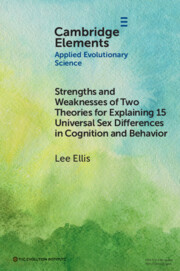Refine search
Actions for selected content:
1 results

Strengths and Weaknesses of Two Theories for Explaining 15 Universal Sex Differences in Cognition and Behavior
-
- Published online:
- 14 August 2025
- Print publication:
- 11 September 2025
-
- Element
- Export citation
